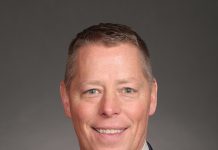William Burt has a story. He has some monikers as well — K Burt, Mr. Burt. But William Burt, the man, the barber, is just trying to serve his community.
Burt learned how to cut hair in prison. Once he was released, he put together a plan to turn his life around by taking his new-found talent to underserved communities in Iowa.
“Well, December of 2017, I came into this idea to separate myself from the traditional barbers in town,” Burt said. “How can I take my skills and my expertise to benefit others? Of course, I knew I needed to pay my bills, but I wanted to separate myself by giving back to the community. It was at that time that the mobile barbershop idea really came into play.”
Burt said he’s always wanted to get into the neighborhood and take haircutting to people, but he lacked the money, and the will, to do it.
“I did a little research and saw all the states around us had one,” he said. “I looked at a few models and just started putting mine together. Midway through putting the mobile barbershop together, I find out that it’s not legal in the state of Iowa.
“I really hit a brick wall at that point.”
That obstacle wasn’t going to redirect Burt.
“My only option was to keep doing it — finish it,” he said. “I knew being the first one in the state of Iowa would eventually gain some ground, but I didn’t know how far I would get with it. I did not know it would be as big of an ordeal as it is today.”
Burt was working with a lady in the small business department at the University of Northern Iowa. He said she had worked with him for about a month. She had an idea to acquire the shop Burt was working in and while getting money for that, he could slide into the mobile barbershop.
“Long story short, we went on about it her way and I bought the vehicle,” Burt said. “I got started doing it, and she texts me out of the blue one day like, ‘hey, I’ve been doing some research on this and the reason no one has done it in Iowa is that it’s illegal. If I was you, I would stop. Don’t waste any more of your money.'”
Burt said at that point, he was angry. And, he wasn’t willing to accept that advice.
“I felt like she should’ve been the one to say, ‘hey, let’s try to fight this thing and get it changed together,'” Burt said. “Instead, I was told not to waste any more money. To me, it could never be wasted money. Even to this point, I haven’t made a dime and I’ve got thousands of money invested. When it’s time, everyone will know what the company stands for and what the founder is about. It’s definitely worth every investment.”
While the email brought forth a range of emotions, it also inspired Burt to be the one to lead the charge to change.
“My story is what’s got me this far,” he said. “I haven’t gotten much negativity. It’s been ‘I really admire your passion to keep going, to create a new you.’ Everybody is definitely looking on and rooting for me. I just feel like my story is probably the biggest thing that I have. Even though there’s a lot of negativity, a lot of prison-going, it still makes me who I am.
“I have a lot to offer because there are kids who are going through the same struggles that I went through over a decade ago, today. I could possibly help one kid who could help someone else.”
Confidence was never an issue for Burt when it came to waging a battle against the law, but he needed some help. And that’s where Americans For Prosperity was able to step in and assist.
“Tyler (Raygor) was a blessing to me,” Burt said. “That’s when everything started to take shape. Before I could even have to start thinking about how I was going to make it happen, I was blessed to meet someone who had more resources.”
Raygor, deputy state director of AFP, said the organization has field staff throughout the state that seeks local issues the group can assist with.
“When Mr. Burt’s story first ran in the Waterloo/Cedar Falls Courier, we kind of didn’t really understand what the problem was at that time,” Raygor said. “We didn’t really look into it that much. Then, we saw a bill was filed by Sen. (Dan) Zumbach last year in January. From there we went and did more research on what was going on and then I gave Mr. Burt a call one morning and said there’s a subcommittee scheduled in an hour, would you mind if I fought for you basically. The rest is kind of history.”
Raygor and AFP provided Burt with the political chops he was lacking.
“This whole political thing is throwing me for a curve,” Burt said. “I definitely didn’t have an eye or a mindset for any of it, but it seems like that’s what the whole ordeal is about — policies and the people who write them. I’ve learned a lot. Being able to open my mind and having new eyes to look at things differently and see it from a policy written perspective has been huge for me.”
Burt said he’s living in the moment now, and that it’s difficult to envision what the day might look like when the battle is won and his dream is no longer illegal.
“When you’re dealing with the struggle day in, day out, trying to pay your bills, trying to make ends meet…I can only imagine what it’s going to feel like,” he said. “I’m ready. I’m looking forward to it.
“It’s hard to explain how much I’m looking forward to it, just having the opportunity to see other people throughout the state be able to partake in what I’m fighting for and to take advantage of the things that have been causing me a lot of sleepless nights.”
Subcommittee meetings are scheduled for Monday, Jan. 27, for the legislation that would provide Burt with his victory. Americans For Prosperity is hoping to bring some folks from the Waterloo community to show support, as well as Burt’s bus so legislators can see it’s nothing to be scared about.
That confidence is still there inside Burt.
“I’ve always had confidence,” he said. “I’m right here. It’s almost inevitable now. The endorsement from the Governor was like the icing on the cake.”
Readers can visit letiowawork.com for more information.











